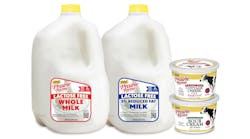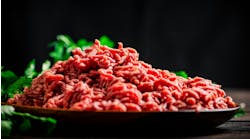It's clear that foods and drinks with nutrients such as protein, carbohydrates and electrolytes can help fuel a workout and sports activities or facilitate recovery from either one. To stay energetic, many athletes turn to high-energy drinks and nutrition bars as nutrient-dense snacks in addition to healthful, balanced meals.
Myostatin is also a natural regulatory protein that inhibits muscle growth and recovery. "It is becoming increasingly apparent that muscle is a master regulatory tissue, which is critical to metabolic and physiologic stability," says Myos Chairman Robert Hariri. He says lowering myostatin levels can increase muscle mass, manage a healthy weight, improve energy levels, stimulate muscle healing and treat sarcopenia, a condition of age-related loss of muscle mass.
Each Re Muscle Health product has 20g of protein. The line comes in six flavors and can be used daily as a snack or meal replacement. "Fortetropin, the active ingredient in Re Muscle Health, is clinically proven to build healthy lean muscle," explains Doug Weekes, Myos' chief commercial officer.
Protein has also been muscling its way into various other sports and energy foods, such as granola bars, cereals, snacks and even conventional products, because it functions as a building block for bones, muscles, cartilage, tissue, skin and blood. Protein's B vitamins help release energy, keep the nervous system functioning properly and help in the formation of red blood cells. Many sports and energy food companies are boosting their products’ protein profiles to meet the needs of fitness-minded consumers, often blending several proteins to create an effective balance of amino acids. The most balanced animal proteins are egg and whey, the standards by which other proteins are judged.
Sports nutrition bars continue to focus on vitamins, minerals and other nutrients, but especially protein. What Mintel calls the U.S. nutritional bar market will grow slowly in the coming years, as the market is driven by demand for healthy foods. Nutritional bars are perceived as healthier than snack and cereal bars, Mintel says.
Serious athletes have been asking for an energy bar that isn’t overly sweet. Coming on the market is a new set of nutrition bars made with savory flavors and whole food ingredients in flavor names and combinations that sound more like a meal than a dessert. As a result, there are important shifts in brand positioning, benefits and product claims.
In May, PowerBar, Parsippany, N.J., renovated two of its namesake long-lasting energy bars: Harvest Bars and Triple Threat Bars. Each is positioned somewhere between a between-meal snack and an energy product. Harvest Bars are now gluten-free, come in seven flavors, pack 10g of protein and have a "clean" list of ingredients. They promise "long-lasting energy." The revised Triple Threat line claims to help build lean muscle and provide sustained energy. It has improved layered flavors, 12g of protein and 3g of fiber. Savory flavor combinations include Clif Bar & Co.'s Clif's Athlete Series of organic energy foods, which come in squeezable pouches. Flavors such as Banana Beet with Ginger, Sweet Potato with Sea Salt and Pizza Margherita were inspired by the home recipes of Team Clif Bar athletes. Each of the four varieties is organic, gluten-free and designed to provide energy from real food ingredients, while satisfying cravings for fruit or salty comfort food.
Emeryville, Calif.-based Clif Bar rolled this sweet/savory collection out last February. "Athletes are increasingly taking a simpler approach to performance nutrition, so we combined real food ingredients in a convenient, resealable pouch,” says Chris Randall, senior brand manager of the Clif Performance Athlete Segment. “Our athletes say these savory recipes help combat palate fatigue, allowing them to consume the nutrition their bodies need during longer-duration activities.”
Goodbye, Gatorade?
There are shifts in consumer behavior and culture that are disrupting the energy and sports drinks markets. Sports and protein drinks cater primarily to athletes and active consumers, but the consumer profile is changing, and the product categories are trying to stay relevant by chasing health and organic beverage trends.
Consumers just aren't drinking as many sports drinks as they once did, and sales have been somewhat deflated by teas and smoothies. The number of consumers who drink eight or more sports drinks a month is lower, offset by more casual sports drink users joining the consumer ranks, according to Packaged Facts' February 2015 report “Functional Foods: Key Trends by Product Categories and Benefits.”
Energy drinks are winning the race over sports drinks and are starting to appear everywhere, from pro wrestling locker rooms to office cubicles and youth soccer matches. This is prompting existing sports drink brand owners to reformulate their drinks to portray a healthier image, reduce sugar content and/or replace artificial ingredients.
Like sports drinks, sales of energy shots (sold in small bottles and containing a dose of a stimulant like caffeine) are also declining, mainly because of their strong medicinal tastes and less favorable position as a supplement, says new information from Mintel Group.
Consumers instead are opting for energy drinks, which can offer functionality and better flavors. Mintel says many shoppers consider energy drinks safer than shots, though some can be loaded with sugar, sodium and artificial ingredients, which runs contrary to their purpose.
Energy beverages like Monster Energy Co.’s new Monster Energy Ultra, Campbell's V8 Fusion + Energy and Red Bull Editions are selling well, by as much as $8.83 billion last year, and are projected to escalate to $10.8 billions this year, Mintel reports.
In fact, the U.S. energy drink market is projected to continue its double-digit growth ride for at least another four years, according to a new report by British market-research company Technavio. The company's report indicates that the energy drink category is expected to increase annually by nearly 12 percent from 2015-2019.
The International Society of Sports Nutrition, Deerfield Beach, Fla., studies fitness and nutrition including the effects of dietary supplements and other ergogenic aids on physical performance as well as the most effective ways to best manage calories for maximum results. Jose Antonio, the group's CEO and co-founder, says the average person is fine drinking water if exercising for an hour or less, although some people go for traditional sports drinks or even energy drinks.
"These drinks aren't really needed for that kind of workout," he says. "But if your goal is to perform better, especially with endurance exercises, an energy drink pre-workout and a sports drink during a work out will definitely help."
“We constantly strive to remain on the forefront of product innovation, and recognize the demand in the marketplace for organic product options,” says CytoSport's chief marketing officer Nikki Brown. “The Muscle Milk brand has always appealed to a wide range of consumers: men, women, active lifestylists, fitness enthusiasts, weekend warriors and professional athletes, and the organic line meets the workout recovery and snack needs for protein users across the entire spectrum. Muscle Milk Organic will also serve as a fantastic protein option to educate new users on the importance of protein in one’s daily nutrition routine.”
New ways with water
In time for summer, Coca-Cola's Glaceau Div., New York, introduced two varieties of Vitaminwater: Vitaminwater refresh, a tropical mango flavor, and Vitaminwater vital-t, which is lemon iced tea flavored with other natural flavors. Both flavors have a summery, thirst-quenching vibe, and are available nationally in 20-oz. bottles.
Coconut also seems to be gaining traction, not only in energy drinks but in energy foods like bars, chips and cereals. Those who must cut out dairy foods can count on coconut products as a good replacement. Unlike coconut milk or oil, coconut water is a clear liquid from the fruit’s center and usually has fewer calories, less sodium, less sugar and more potassium than many sports drinks.
Most unflavored coconut water contains few calories but has easily digestible carbohydrates in the form of sugar and electrolytes. Its hydration properties are being noticed by sports beverage marketers, and a with few added sugars and colors, some beverage companies are making coconut-water based sports and protein drinks, Packaged Facts notes.
An example that's ready to drink is O.N.E. pure coconut water, from One World Enterprises LLC, a part of PepsiCo since 2012. O.N.E. offers hydrating and energizing properties and comes in flavors splashed with mango and pineapple, as well as two new coconut water with tea versions in Wild Orange and Tropical Colada.
Vital Juice Co. is a Seattle-based pressed organic juice retailer created by a former Mircrosoft executive Edward Balassanian and his Be Labs incubator. The company says its Vital Coconut Young Coconut Water made from young Thai coconuts has absolutely nothing added to it, such as sugars, flavor concentrates or regular water, and is not frozen or pasteurized.
Combining protein and coconut water in the ready-to-drink (RTD) protein drinks segment, MusclePharm Corp., Newark, Ohio, launched CocoProtein last October for every type of fitness enthusiast, from runners and lifters to hikers and those on-the-go. The cross-over beverage features a blend of coconut water as well as protein and provides vitamins, minerals and 20g of protein to build lean muscle. It also has more potassium than a banana. In addition, it's free of gluten, lactose and dairy, says CEO Brad Pyatt. "It's the perfect complement to any workout and healthy lifestyle, with an excellent flavor profile and a smooth and light texture."


